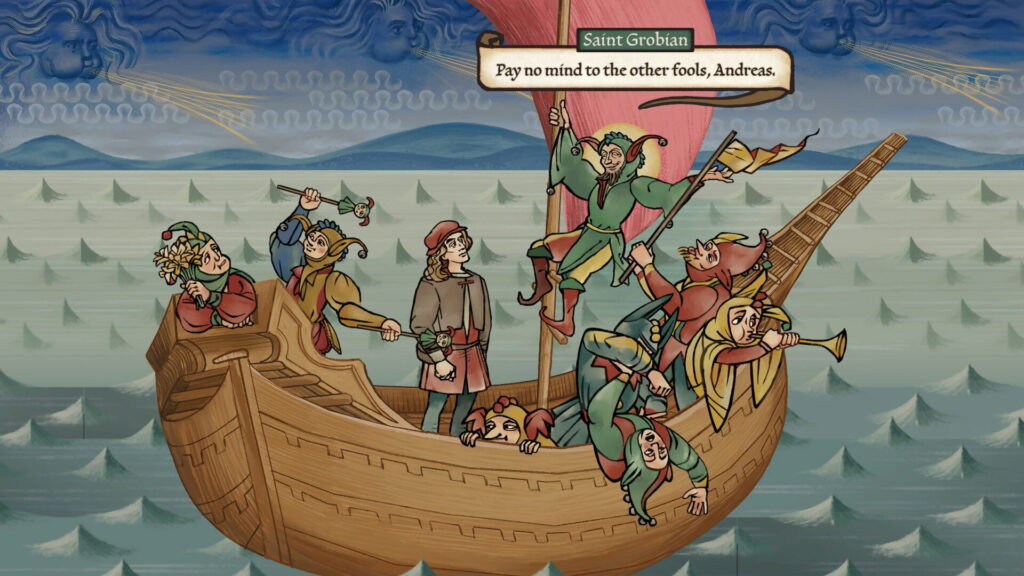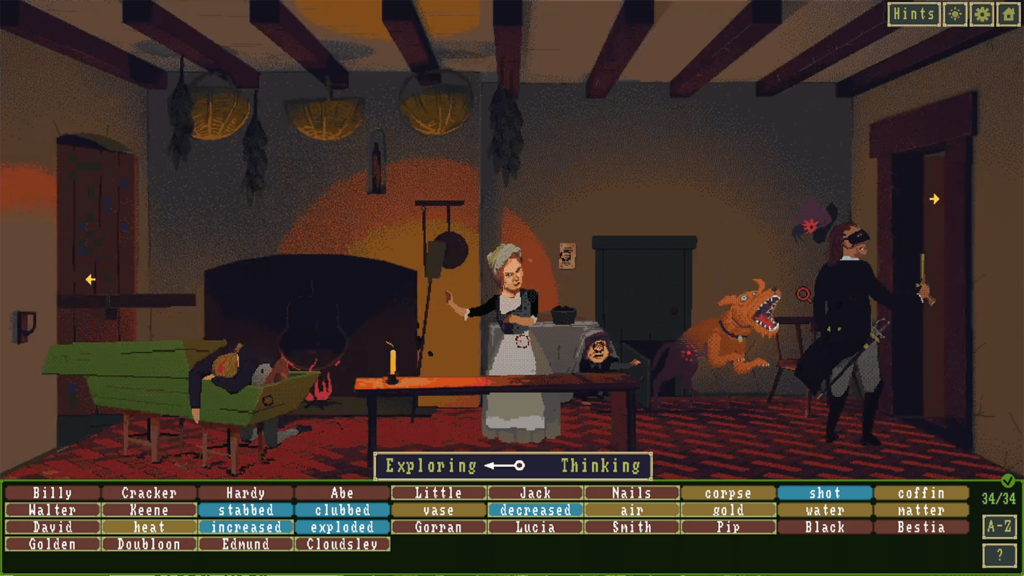Gaming Notes

By popular demand (i.e., one or two people in the comments) I am breaking up my yearly games roundup into periodic updates over the course of the year. No idea how regular these posts are going to be, since my gaming tends to be rather irregular—this post, for example, covers the first four months of the year. Obviously, the recent conversation about games has mostly centered around some huge new releases, but you won’t find discussion of Star Wars Jedi: Survivor or The Legend of Zelda: Tears of the Kingdom here, for the simple reason that I am bad at games like that. I’ve also found that my patience with long games has really worn away in the last few years. The games I discuss in this post, therefore, are short, mostly-plotty, and require a bare minimum of running and jumping.
A couple of games that I’ve started in the last few months and then put down, though I may go back to finish them at some point. First, Card Shark (2022) by Nerial, in which you play a tavern servant in 18th century France who is adopted by a gambler and taught various strategies for cheating at cards, applying them as your mentor pursues a conspiracy among the ranks of the nobility. The graphics and setting are quite delightful, but I eventually got confused and tired of the various cheating strategies, most of which require you to remember non-intuitive sequences of mouse and keyboard movements. (This is also my opportunity to note that if you sell a game for PC, it should fucking work on a PC rather than informing the player that a game controller is “preferred”.)
Second, last year’s indie game darling, Pentiment, by Obsidian Entertainment. On paper, this game should be 100% my jam—a Name of the Rose-esque mystery set in a medieval Alpine village and revolving around the local monastery and its scriptorium. And, from what little I have played, it does feel as if Pentiment could eventually become something extremely involving. But to begin with, the game is just so. Damn. Slow. I’ve played for two hours and I still don’t feel as if I’ve reached the beginning of the story. Every character you meet has reams of dialogue to deliver, and there are so many different locations you can go to and people to meet there, that what thread of story there is quickly gets lost. I’m sure I’ll go back to Pentiment eventually, and maybe it’ll end up being my favorite the way it was for so many people, but right now it’s the opposite of gripping.
And now, some games I have finished!

The Case of the Golden Idol (2022)
I had a bit of a gaming slump at the end of last year and the beginning of this one. Latvian studio Color Gray Games’s debut offering proved the perfect way to entice me back into the habit. Short and perfectly formed, The Case of the Golden Idol draws obvious inspiration from Lucas Pope’s Return of the Obra Dinn (2018), combining logic puzzles with an 18th century murder mystery. In each level, you’re presented with a scene depicting the immediate aftermath of some act of violence, which you can scour for clues. You then have to answer questions about what happened in the scene based on those clues. As the levels progress, the scenarios get more involved and the questions more complicated—you have to work out which room in a country manor belongs to which servant in order to know who among them has been forging a key to the master’s safe, or unravel the rituals of a secret society in order to understand how one of them has been corrupted to abet murder.
The mysteries are extremely satisfying, steadily upping the difficulty level while still playing fair, with a simple, straightforward interface that lets you focus on detecting rather than game mechanics. (The graphics, meanwhile, are hilariously ugly, a sort of cross between pixel art and Hogarthian cartoons.) But what makes the game truly delightful is the story that unspools with each level, a multi-generational saga of murder and betrayal that starts with European explorers pilfering the titular item, and ends with English society upended by a cult powered by its magical properties. It’s a story that perfectly captures the lurid, pulpy tone of these sorts of adventures, while poking fun at the pompousness and self-regard of the aristocratic characters.
Much like Return of the Obra Dinn, The Case of the Golden Idol has limited replayability value once you’ve solved the puzzle. But unlike the earlier game, it isn’t locked into a single story. Both the mechanic and setting are infinitely expandable, as seen in the DLC The Spider of Lanka, released just last week. It provides an enjoyable prologue to the main game’s story, and ups the difficulty level of the mysteries quite substantially. The concept of the game is so versatile that one can easily imagine even more expansion packs coming. Even if they don’t, however, playing the game once is so satisfying that I have no hesitation in recommending it, and am looking forward to whatever this studio produces next.

Toem (2021)
Another short and sweet game that was exactly what I was looking for. Subtitled “A Photo Adventure”, the game has you playing a cute little creature who has been gifted a camera by their grandmother and sent exploring. The ultimate goal is to capture an image of the titular natural phenomenon (the game’s developers, Something We Made, are Swedish, and everything here, from the place names to the character vocalizations, has a vague Scandinavian sound). But this is really more of an excuse for the player to go adventuring, visiting locations along a map and taking pictures at each one. In order to earn a trip to the next location, you have to complete tasks, some of which are straightforwardly photography-based—collecting pictures of all the animals in every location; documenting the graffiti on a city’s walls; fulfilling challenges from the local photography club—and some that just use the camera as an excuse for scavenger hunts, such as an archeologist constructing a T-Rex skeleton who sends you to photograph the locations of all the missing pieces, or an attachment that allows your camera to shoot water balloons, with which you can hydrate a certain number of dying plants.
The whole concept is very reminiscent of Adam Robinson-Yu’s A Short Hike (2019)—a gentle bit of exploration during which your character performs tasks for others that allow them to progress in their journey. But the execution of Toem feels stronger on almost every level. The level design is cleaner and easier to navigate; the tasks are more organized and easier to keep track of; and it’s possible to advance to a new location without completing every task in the current one, giving you space to learn the rules of the world without feeling stuck and frustrated, and eventually go back and complete everything. Most importantly, the photography mechanic—contrived as it sometimes is—ties the game together in an extremely satisfying way. There’s a real sense of accomplishment when you get a shot you’ve been trying to capture, not least because doing so is so different from most other games, where you collect items to solve puzzles or gun down opponents standing in your way. The feeling of having added to your book of memories while leaving the environment you made them in largely as it was (and thus ready for the next adventurer) is entirely in keeping with the game’s mellow vibe, and makes Toem a more coherent game than a lot of others that struggle to justify their core mechanic. Playing it may not be as relaxing as taking a walk through nature, but it has some of the same properties.

Rytmos (2023)
I have a complicated relationship with puzzle games. By which I mean “I’m only haphazardly good at them, and my threshold for boredom and frustration is buried somewhere near the Earth’s molten core”. So the habitable zone between “this is too easy and therefore boring” and “this is too hard so I’m dropping it” is a pretty thin sliver for me. Some games get around that issue through interesting story or worldbuilding—I wasn’t terribly challenged by the puzzles in The Gardens Between (2018), but I liked the way they were used to illustrate a moving personal story; and conversely, I started using hint guides about halfway into The Witness (2016), but was so consumed by exploring the game’s bizarre world that this didn’t cut into my enjoyment at all. But for pure puzzle games, it can be pretty easy to lose my interest—I was absolutely obsessed with the brilliant, utterly unique Baba is You (2019), but at some point the game boards just had too many moving pieces for my poor brain, and I haven’t gone back to finish it in years.
So when I say that Rytmos, by Danish studio Floppy Club, hit the perfect sweet spot for me, that’s really more about it finding the correct (for me) combination of challenging and hand-holding. Not unlike The Witness, the game asks you to draw paths along game boards—you have to collect all the tokens on the board with the path, and end where you began. With each level, more elements are added—you can change the board’s shape, or move obstacles around it. But what matters here isn’t the specifics of the puzzles but how elegantly and effectively Rytmos teaches you to solve them, introducing new ideas each time, letting you get used to them, and then upping the ante. It’s also not a game that overwhelms you with options. A lot of puzzles can be solved by realizing that there are only a limited number of legal moves, and methodically working your way through them. I sometimes needed to put a puzzle down and come back to it later (and happily the game lets you switch between several different environments), but there wasn’t anything here that truly stumped me. That might mean that Rytmos is too easy (it only took me a few hours to finish the whole thing) but for me it was absolutely perfect.
While the game doesn’t have a story or even much of a world, it does have a theme. Each puzzle family is used to illustrate some niche musical genre, like Ethiopian jazz, German electronica, or Japanese environmental music. As you complete the paths, new notes start to sound according to the rhythm of that genre. Solving puzzles unleashes new musical phrases, and the more puzzle boards you solve, the more vibrant the game’s soundscape becomes. Solving a whole set gives you more information about the genre and its key instruments, with a reward screen that allows you to “play” some of them and even record your own music. It’s not the most involving of concepts—though it has an educational aspect that might make the game an even better fit for kids—but it gives Rytmos a unique flavor, and makes playing it all the more fun.
Consider this an open thread for all things gaming-related. What are you playing? What are you stuck on? Are you looking forward to the new Zelda and Star Wars games?


